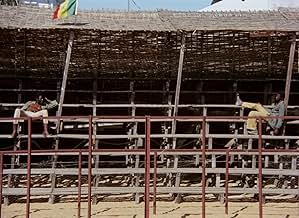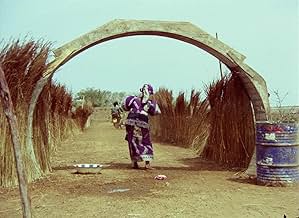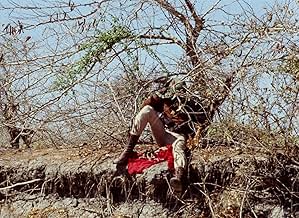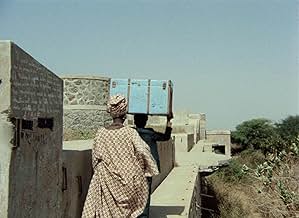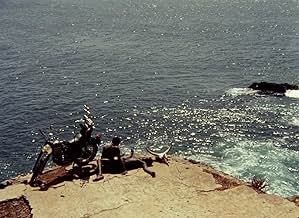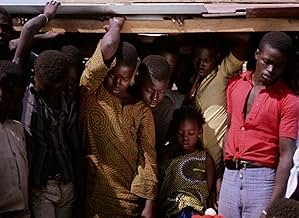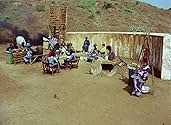NOTE IMDb
7,0/10
4,4 k
MA NOTE
Ajouter une intrigue dans votre langueMory, a cowherd, and Anta, a university student, try to make money in order to go to Paris and leave their boring past behind.Mory, a cowherd, and Anta, a university student, try to make money in order to go to Paris and leave their boring past behind.Mory, a cowherd, and Anta, a university student, try to make money in order to go to Paris and leave their boring past behind.
- Réalisation
- Scénario
- Casting principal
- Récompenses
- 2 victoires et 1 nomination au total
Myriam Niang
- Anta
- (as Mareme Niang)
Josephine Baker
- Joséphine Baker
- (voix)
- (as Joséphine Baker)
Avis à la une
An African film here about youth, about the thirst to escape from a place that parches it and the bike ride through dirt roads out to sea where a ship sails for Europe. But I want to avoid merely a museum visit or an aesthetic token from a faraway place, I want the heart that pounds behind appearances and gives rise to their breeze of color. What heart here?
First are the things he says about the home that is left behind. Symbolic cows being led to slaughter and cut to the young lead riding his motorbike with cow horns on the wheel. A stolen chest, supposedly full of money to pay for a DeGaulle statue but it contains a corpse.
These are the things the filmmaker knows exactly what he wants to say about. They're also the least interesting to watch for me. The young lead being wrestled by leftist students is intercut with cows being wrestled before the slaughter. The dear bike stolen by a savage white man and left broken while he's extracted with merely a broken leg. Not without nuance, but some of it is as didactic as we make fun of Hollywood.
More tantalizing is the journey through these to outrun them, even more so once you realize this is the same journey the filmmaker himself made from that same port. A yearning for freedom, but the desired freedom is a life of material comforts in Europe, what every boy his age would dream about, cafés and girls. Meanwhile the girl meekly tugs along behind her childish man. There's a sense that she quietly yearns for more; but she also feels beautiful in the (stolen) pink suit and red hat, as any girl would. I like films where youth is embraced with its dreams and folly, this is one.
But also a deeper heart, things which the filmmaker doesn't know how to express clearly but vaguely feels stirring. There are a few of these where the surface of the film is rippled by some hidden vortix that seems to rage in the deep, like when the girl thinks he has drowned. If the journey is Godard, this is Pasolini. This might be part of what some reviews note as sloppy technique. True. This is a man still trying to fathom how images can surround a feel.
So this is it here, a journey where as these two lovers flee, they get caught up in situations that tear from them images of who they are and what their surrounding world is like, images the air takes along which become the film. In the end one self is left behind, the one who has not outrun this world.
First are the things he says about the home that is left behind. Symbolic cows being led to slaughter and cut to the young lead riding his motorbike with cow horns on the wheel. A stolen chest, supposedly full of money to pay for a DeGaulle statue but it contains a corpse.
These are the things the filmmaker knows exactly what he wants to say about. They're also the least interesting to watch for me. The young lead being wrestled by leftist students is intercut with cows being wrestled before the slaughter. The dear bike stolen by a savage white man and left broken while he's extracted with merely a broken leg. Not without nuance, but some of it is as didactic as we make fun of Hollywood.
More tantalizing is the journey through these to outrun them, even more so once you realize this is the same journey the filmmaker himself made from that same port. A yearning for freedom, but the desired freedom is a life of material comforts in Europe, what every boy his age would dream about, cafés and girls. Meanwhile the girl meekly tugs along behind her childish man. There's a sense that she quietly yearns for more; but she also feels beautiful in the (stolen) pink suit and red hat, as any girl would. I like films where youth is embraced with its dreams and folly, this is one.
But also a deeper heart, things which the filmmaker doesn't know how to express clearly but vaguely feels stirring. There are a few of these where the surface of the film is rippled by some hidden vortix that seems to rage in the deep, like when the girl thinks he has drowned. If the journey is Godard, this is Pasolini. This might be part of what some reviews note as sloppy technique. True. This is a man still trying to fathom how images can surround a feel.
So this is it here, a journey where as these two lovers flee, they get caught up in situations that tear from them images of who they are and what their surrounding world is like, images the air takes along which become the film. In the end one self is left behind, the one who has not outrun this world.
Two young people attempt to escape the poverty of their native Senegal and move to Paris. They raise some funds by committing petty crimes.
Touki Bouki is a very distinctive film that's for sure. The African continent hasn't been renowned for producing a great deal of important movies but this one certainly qualifies as such. It has a pretty basic story-line but it's not a plot-driven affair at all really. In actual fact it is quite experimental in approach much of the time and seems to have been influenced by the European New Wave films quite a bit. But what gives it its edge is that within that it is very specifically Senegalese. It's not often we see much from this part of the world represented in cinema, especially not from over forty years ago and certainly rarely from actual Senegalese film-makers. It's this Senegalese colour and authenticity, combined with the bold experimental cinematic presentation that makes this one very much stand out. In truth, I don't think I fully appreciated all its nuances on first viewing and would certainly like to return to it sometime in the future. Be warned though, it does contain some pretty brutal scenes of animal slaughter which make for difficult viewing. All-in-all though, this unusual film has a great deal of character and its strong sense of location makes for fascinating viewing.
Touki Bouki is a very distinctive film that's for sure. The African continent hasn't been renowned for producing a great deal of important movies but this one certainly qualifies as such. It has a pretty basic story-line but it's not a plot-driven affair at all really. In actual fact it is quite experimental in approach much of the time and seems to have been influenced by the European New Wave films quite a bit. But what gives it its edge is that within that it is very specifically Senegalese. It's not often we see much from this part of the world represented in cinema, especially not from over forty years ago and certainly rarely from actual Senegalese film-makers. It's this Senegalese colour and authenticity, combined with the bold experimental cinematic presentation that makes this one very much stand out. In truth, I don't think I fully appreciated all its nuances on first viewing and would certainly like to return to it sometime in the future. Be warned though, it does contain some pretty brutal scenes of animal slaughter which make for difficult viewing. All-in-all though, this unusual film has a great deal of character and its strong sense of location makes for fascinating viewing.
First, I didn't like the movie because I felt I wasn't able to enjoy it really. It made the impression of a TV documentary on how livestock is mistreated in Western Africa.
Then, by quite confusingly repeating a scene scored by somewhat mystical pop music, the film turned to the other extreme and made me consider it over-sybolistic.
Then, finally, the actual story began, and I could figure out various things. I could separate dream from reality, although this was not so easy, and I thought the film was too clichéd at some moments (e. g. the fat gay man, who was charming but a little camp).
Now that the film is over and I thought back to it I believe it is not at all a bad movie. Many discontinuities and an unusual narrative style are something we should welcome. Regarding the images and colours it is a wonderful piece of work. The film seems like brilliant illustration of an average story.
Then, by quite confusingly repeating a scene scored by somewhat mystical pop music, the film turned to the other extreme and made me consider it over-sybolistic.
Then, finally, the actual story began, and I could figure out various things. I could separate dream from reality, although this was not so easy, and I thought the film was too clichéd at some moments (e. g. the fat gay man, who was charming but a little camp).
Now that the film is over and I thought back to it I believe it is not at all a bad movie. Many discontinuities and an unusual narrative style are something we should welcome. Regarding the images and colours it is a wonderful piece of work. The film seems like brilliant illustration of an average story.
I went to the London Film Festival in October 2008 to watch a film from the past, a "Treasure from the Archive". However whilst Touki Bouki was made over 35 years ago it still remains incredibly relevant. Young Africans still drown trying to cross the Straits of Gibraltar to Europe every day. That's what this film is about, the desperation of ordinary Africans (specifically from a Senegalese perspective) yearning to find prosperity and stability. It's one of those films I would class as a "scream of despair". Even if there are some very funny scenes, these scenes are like the scenes of humour that Ford would inject into his Westerns to mollify audience gloom. It would not surprise me if that were a direct influence, but if he wasn't cine-literate, then Djibril must rank as the most precocious director of all time.
The bare bones of the plot of the film concerns Mory, who is a sometime cattle herder, and Anta his girlfriend who is a university student. This especially winsome couple want desperately to escape to Europe. Mory is the object of ridicule in his community, intelligent, but useless and uppity, whilst Anta's university is no real safe-haven of learning, what with it being full of decadent revolutionaries (not an oxymoron). Both yearn to live in France.
As close to a true narrative as we get is that they go to a wrestling match and attempt to steal the stadium's cash box. There are two boxes, a yellow one and a blue one, they can't take both and aren't sure which one holds the loot. They take the blue one and when they get to their deserted, ruined, ex-colonial bunker hideout realise that it is filled with Voodoo craziness, runes and skulls and such. This for me is high Surrealism.
Plan B is to steal clothes, money, and a car off a rich idler who lives in a seaside villa surrounded by catamites. Plan B is successful, exeunt Mory and Anta pursued by the lo (sic).
Dressed as highfalutin dandies they revisit Mory's community driving in a stars-and-stripes festooned car where they are treated as a Lord and his Lady. Whether this is actual plotting or wish-fulfilment dreaming is left up to the viewer to decide.
After Fellinian parades of the mind the story returns to earth with a bump as Mory and Anta reach a port and try to escape to France.
One thing that stands out in the film is the anti-French criticism. The French bourgeois who make their living in Senegal are shown as treating Senegalese as some sort of bonobo-child chimeras. Also there is the aforementioned wrestling match, which is a "charity" event organised to raise money to build a statue of General de Gaulle (the height of absurdism?). This is also internally-driven criticism as the organisers are chiefs of a Senegalese tribe.
The film is ambivalent about life in Senegal, whilst Mory and Anta yearn to leave, Mambéty also shows us beautiful scenes of daily life in Senegal, and the humour of the populace. One part for me stands out, a parade of Senegalese carrying water on their heads in semi-transparent plastic buckets, the sunlight shining through the buckets transforms them into preternatural magic lanterns, the framing is exquisite, the camerashot is filled with green and blue corruscation. The point is that this guy Mambéty is not some sort of amateur who is esteemed out of political correctness, this guy is a force of nature, a director whose capability of expression is really begging to be called primus inter pares when compared to the likes of Parajanov and Bunuel.
One strong warning is that this movie contains scenes of cattle being slaughtered both in abbatoirs and outside of them, right at the start of the film. Really gruesome in the extreme, and far more graphic for example than the familiar scene of an ox being slaughtered in Apocalypse Now. The point of it is metaphorical, young African men are treated as no less than cattle to be slaughtered, fodder for the consumer games of power structures, ultimately commoditised.
The bare bones of the plot of the film concerns Mory, who is a sometime cattle herder, and Anta his girlfriend who is a university student. This especially winsome couple want desperately to escape to Europe. Mory is the object of ridicule in his community, intelligent, but useless and uppity, whilst Anta's university is no real safe-haven of learning, what with it being full of decadent revolutionaries (not an oxymoron). Both yearn to live in France.
As close to a true narrative as we get is that they go to a wrestling match and attempt to steal the stadium's cash box. There are two boxes, a yellow one and a blue one, they can't take both and aren't sure which one holds the loot. They take the blue one and when they get to their deserted, ruined, ex-colonial bunker hideout realise that it is filled with Voodoo craziness, runes and skulls and such. This for me is high Surrealism.
Plan B is to steal clothes, money, and a car off a rich idler who lives in a seaside villa surrounded by catamites. Plan B is successful, exeunt Mory and Anta pursued by the lo (sic).
Dressed as highfalutin dandies they revisit Mory's community driving in a stars-and-stripes festooned car where they are treated as a Lord and his Lady. Whether this is actual plotting or wish-fulfilment dreaming is left up to the viewer to decide.
After Fellinian parades of the mind the story returns to earth with a bump as Mory and Anta reach a port and try to escape to France.
One thing that stands out in the film is the anti-French criticism. The French bourgeois who make their living in Senegal are shown as treating Senegalese as some sort of bonobo-child chimeras. Also there is the aforementioned wrestling match, which is a "charity" event organised to raise money to build a statue of General de Gaulle (the height of absurdism?). This is also internally-driven criticism as the organisers are chiefs of a Senegalese tribe.
The film is ambivalent about life in Senegal, whilst Mory and Anta yearn to leave, Mambéty also shows us beautiful scenes of daily life in Senegal, and the humour of the populace. One part for me stands out, a parade of Senegalese carrying water on their heads in semi-transparent plastic buckets, the sunlight shining through the buckets transforms them into preternatural magic lanterns, the framing is exquisite, the camerashot is filled with green and blue corruscation. The point is that this guy Mambéty is not some sort of amateur who is esteemed out of political correctness, this guy is a force of nature, a director whose capability of expression is really begging to be called primus inter pares when compared to the likes of Parajanov and Bunuel.
One strong warning is that this movie contains scenes of cattle being slaughtered both in abbatoirs and outside of them, right at the start of the film. Really gruesome in the extreme, and far more graphic for example than the familiar scene of an ox being slaughtered in Apocalypse Now. The point of it is metaphorical, young African men are treated as no less than cattle to be slaughtered, fodder for the consumer games of power structures, ultimately commoditised.
Mory, a cowherd, and Anta, a university student, try to make money in order to go to Paris and leave their boring past behind.
This film looks great and is just very interesting from the whole clash of cultures perspective. You have some African tradition here, and mixed in with that you have some Muslim practices. I am no expert, but I suspect Islam in Senegal is much different than in the Middle East. It's an interesting blend. And then, of course, you have the modern world of France, which is different from either of those cultures.
What may strike viewers the most, especially because it happens so early in the film (and is repeated later), is the slaughter of the cattle. Whether the methods shown are humane or not, I have no idea. But they look brutal, and to the modern world it may be a shock to see something that has become so far removed from our everyday life. Now, food is food, and we rarely see that once upon a time it was a living thing.
This film looks great and is just very interesting from the whole clash of cultures perspective. You have some African tradition here, and mixed in with that you have some Muslim practices. I am no expert, but I suspect Islam in Senegal is much different than in the Middle East. It's an interesting blend. And then, of course, you have the modern world of France, which is different from either of those cultures.
What may strike viewers the most, especially because it happens so early in the film (and is repeated later), is the slaughter of the cattle. Whether the methods shown are humane or not, I have no idea. But they look brutal, and to the modern world it may be a shock to see something that has become so far removed from our everyday life. Now, food is food, and we rarely see that once upon a time it was a living thing.
Le saviez-vous
- AnecdotesThis film is believed to be Africa's first avant-garde film, although Soleil Ô (1970) could also make this claim.
- ConnexionsFeatured in Caméra d'Afrique (1983)
- Bandes originalesParis, Paris, Paris
(Madrid) (uncredited)
Music by Agustín Lara
Spanish lyrics by Agustín Lara
French lyrics by Georges Tabet
Performed by Josephine Baker
Meilleurs choix
Connectez-vous pour évaluer et suivre la liste de favoris afin de recevoir des recommandations personnalisées
- How long is Touki Bouki?Alimenté par Alexa
Détails
Box-office
- Montant brut mondial
- 180 $US
- Durée1 heure 25 minutes
- Mixage
- Rapport de forme
- 1.37 : 1
Contribuer à cette page
Suggérer une modification ou ajouter du contenu manquant

Lacune principale
By what name was Touki Bouki (1973) officially released in Canada in English?
Répondre
